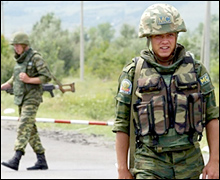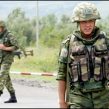
THE WEST IS CONFUSED ABOUT WHAT TO DO IN ABKHAZIA
Publication: Eurasia Daily Monitor Volume: 5 Issue: 122
By:

Two explosions were reported on the railroad near Sokhumi, the capital of Georgia’s breakaway region of Abkhazia. The explosions happened near the positions of Russian Railroad Troops who are now repairing the tracks that in the future may be used for deploying Russian tanks and other heavy weapons in the conflict zone (see EDM, June 12). The Abkhaz authorities reported that the explosions were the result of “sabotage,” while the Georgian authorities denied any involvement. There were no casualties (Interfax, June 18).
Last week the Georgian Interior Ministry announced that it had arrested four Russian peacekeepers in the Zugdidi district near the ceasefire line in Abkhazia. The Russians were driving a Ural truck with over 20 anti-tank guided missiles that the Georgians claimed were illegally moved into the conflict zone. The Georgians announced that they had acted on a tip-off. The Russian soldiers and the truck driver were later released, but the missiles were kept in custody, pending further investigation (RIA-Novosti, Interfax, June 18).
The Russian peacekeepers in Abkhazia did not tell the Georgian authorities that they would be moving anti-tank weapons through Georgian-controlled territory. It cannot be excluded that the tip-off that led to the arms-seizing incident was the result of a Georgian sting operation: Russian solders may have been tempted to sell the weapons on the side. In any event, the incident was highly publicized and televised by the Georgian side, so the entire situation smacks of deliberate provocation against the Russian peacekeepers whom the Georgians consider occupying troops.
Russian Deputy Chief of General Staff Alexander Burutin answered by issuing a threatening statement: The apprehension of solders and weapons was described as a “highwayman attack.” It was announced that in the future the Russian peacekeepers may use weapons to defend themselves and the consequences of this “may be extremely serious–actual bloodshed” for which “Georgia will be responsible.” According to Burutin, “the situation in Abkhazia and South Ossetia has recently seriously deteriorated.” In return, Georgian Deputy Foreign Minister Grigol Vashadze, speaking at a conference in Tbilisi, announced, “Russia has constantly threatened us with bloodshed, but we are not afraid” (RIA-Novosti, June 19).
At the conference a joint U.S.-based Atlantic Council and Colombia University delegation that visited Abkhazia and Georgia last week presented its preliminary brief on the current situation. It stated: “Abkhazia is in a state of disrepair, Sokhumi is an empty city, the infrastructure is in a poor state, the water is polluted and the hotels are empty. Abkhazia will need massive investment for basic restoration. The Abkhaz leadership describes Georgia as a militarist state and has no desire to discuss anything but full independence. The withdrawal of Georgian security forces from the upper Kodori is a precondition for resuming any talks. The Abkhaz leaders have uneasy relations with Moscow but need Russia as a security guarantee. The rag-tag Abkhazian forces we met are clearly unable to defend Abkhazia.”
Prewar Abkhazia had 550,000 inhabitants in 1990, half of them ethnic Georgians. Now as a result of the ethnic cleansing of the majority of Georgians and the emigration of others from the poverty-stricken region, the population has shrunk to between 140,000 and 150,000. The Abkhaz leader Sergei Bagapsh boasts that 40,000 to 50,000 Georgians have returned to the Gali district in the south of Abkhazia, and that is more than enough, according to him. The UNHCR office believes that Abkhazia is violating the human right to return. There is no independent verification of the number of Georgian returnees, and there is no security, no property return or rehabilitation for Georgians in Gali.
There do not seem to be any points of agreement between the sides on how to avoid future escalation of the conflict. What is worse, the sides are hardly speaking to each other, let alone listening. Vashadze said that Moscow had indicated that it might allow Georgia to retain nominal sovereignty over Abkhazia and South Ossetia but only if it repudiated its bid to join NATO. Last January in a national referendum, however, over 70 percent of Georgians voted to join the alliance, and the government in Tbilisi is in no position to ignore their expressed will.
The West is at present annoyed by the growing tension but not ready to intervene seriously. The Georgians want to replace or supplement Russian peacekeepers with a multinational force, but EU nations do not have extra troops to send and also believe that Afghanistan, Sudan, Lebanon, Iraq and Iran are more serious problems. Meanwhile, according to OSCE observers in South Ossetia, there are shooting incidents virtually every day.
In Moscow generals and diplomats do not issue threatening statements without explicit authorization from the top leaders. The language of General Burutin’s statement may indicate that Moscow has already made a tentative political decision to commence serious military action in Abkhazia and/or Ossetia in the coming months. Western indifference may be ill-timed.




